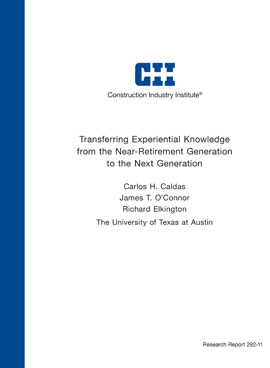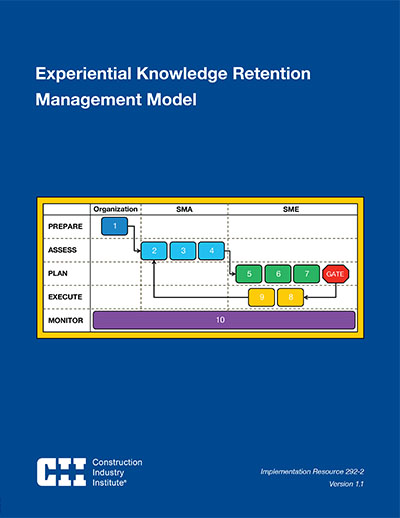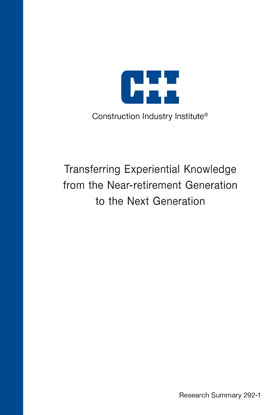
Transferring Experiential Knowledge from the Near-Retirement Generation to the Next Generation
As the baby boomer generation nears the traditional retirement age of 65, organizations are finding themselves facing a potential mass exodus of their most senior and experienced employees; the capital projects industry is no exception. These potential retirees have a knowledge inventory accrued through a career of successes and failures in their field. This knowledge base is often the foundation of decisions that enhance operational efficiency, foster innovation, reduce the occurrence of critical errors, and enable corporate growth strategies. Traditional human resources practices aim at replacing the individual and often do little to consider how their wealth of experiential knowledge can be retained prior to their departure. Not only does this practice affect an organization’s capacity to operate effectively, but replacing an experienced individual with someone from the outside can cost an organization, in addition to the new hire’s salary, anywhere from 50% to 150% of the salary in additional costs attributable to various indirect turnover costs.
CII formed RT-292, Transferring Experiential Knowledge from the Near Retirement Generation to the Next Generation, to address the increased rate of knowledge loss in the capital projects industry; specifically aimed at retaining experiential knowledge at risk of being lost due to retirements. RT-292 investigated the current state of experiential knowledge management within the industry in order to understand the knowledge transfer problem in terms of magnitude and dynamics, and what the contributing factors and barriers to success are. Research conducted by RT-292 helped gain an understanding of the value added through effective experiential knowledge retention, enabled a definition of what constitutes the framework of an effective experiential knowledge retention model, and helped in the development of a customizable knowledge retention program.
The team conducted interviews, surveys, and case studies and consulted heavily with industry knowledge management and human resources experts to frame the problem and understand what constitutes a successful experiential knowledge retention program. The result is a knowledge retention model that, at a high level, aids in the implementation and preparation of a corporate knowledge retention program, assesses current risk of experiential knowledge loss across organizational knowledge areas called Subject Matter Areas (SMAs), identifies at-risk individuals whose departure would result in the loss of considerable experiential knowledge, provides a mechanism for effectively planning to transfer/retain the knowledge at risk, and offers suggestions for implementing the plan. The model also includes suggestions for monitoring and improving the model as a whole as it progresses through the various levels of granularity from companywide to individual Subject Matter Experts (SMEs). The model details are available in IR292-2. Implementation of the model outlined therein will help organizations to shift from a reactive response to knowledge loss and retirement to a proactive knowledge sharing culture that minimizes the impact of retirements.
Typical elements of a Knowledge Management Program include the following phases:
- Prepare for KM Effort
- Conduct a Risk Assessment
- Determination and Implementation of Plan
- Monitoring and Evaluation
For the case studies, the organizations have the push for a more mature knowledge management program was motivated by the desire to provide a continuous level of service across geographic boundaries.



